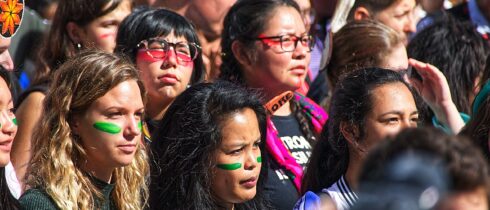

Climate policies must centre women’s unique needs and vulnerabilities
Climate policies must centre women’s unique needs and vulnerabilities
By Alimatu Dimonekene MBE.
Climate change is here to stay and worsening, and it hits women in under addressed ways — especially heads of households, who are economically and physically vulnerable in the aftermath of a natural disaster. Governments need to plan their climate responses around these needs, or risk failing and abandoning more than half their populations.
The New York Times recently profiled Africa’s first “heat officer,” a brave woman tackling the extreme and lengthy heat in Sierra Leone by planting a million trees in Freetown. This is a noble pursuit, but the policy ignores the root causes of Sierra Leone’s rising temperatures . As the heat rises, we also see a rise in vulnerability to climate change for women of Sierra Leone.
Sierra Leone has seen recurring floods and mudslides in the last several years. The country suffered one of its worst tragedies in August 2017, when devastating torrential rains caused flooding and massive mudslides, affecting the Mortormeh, Kamayama, and Kaningo communities on the outskirts of Freetown. Many of the survivors, mostly women, struggled to adapt or cope after the floods. What has been evident is that some women survivors mostly from single headed households reported that they have not received financial support that could sustain their livelihoods four years post disaster.
Though food and medical aid was provided almost immediately post disaster. According to a World Bank report “early intervention and appropriate psychosocial support could help to mitigate some of these risks.”
As an activist and advocate working with women in Sierra Leone post disasters, some of the evidence on the ground showed that the authorities failed to support victims despite warnings from experts, bilateral partners and donors advising at the time that remedial financial assistance and support in the short term would benefit victims and survivors. Gender-based discrimination is prohibited by every major international human rights treaty. Gender and sexualbased violence remains a pervasive issue in Sierra Leone which further compounds the issues of discrimination and marginalization of all women. According to Concern Worldwide, 61% of women in Sierra Leone will experience gender-based violence (GBV) in their lifetime and 62% of women in Sierra Leone have reported experiencing violence over the last 12 months.
At the time of the disaster 27.4% of women were heading their own household of which many were illiterate, widowed, and or abandoned by partners. Further exposing them to cycles of poverty and other vulnerabilities like violence and abuse. In an already heavy patriarchal society often without a man in the lives of these women they will have no access to services and support.
Gendered specific policies works
India is taking some progressive actions, looking closely at the effects of gender and climate change on the socio-economic rights of women by putting in place specific gender sensitive policies through the implementation of legislations. An example of this can be seen in the government examining key structural factors such as looking at the issues surrounding climate injustices to examining land rights of women and providing support for rural communities affected by climate change and environmental disasters.
By comparison, many countries including Sierra Leone are behind in implementing actions in the long term that will go towards mitigating the impact of future climate change disasters as well and coping with the effects of environment disasters. Sierra Leone’s government should incorporate gender sensitive policies which seek to adopt planning for disaster mitigation and preparedness.
To be sure, budgets are stretched everywhere, and Sierra Leone is one of the world’s poorest countries. The former government of Dr Ernest Koroma was ill prepared to mitigate the disaster. But the current government with its international partners have put in place actions to reduce climate change vulnerability regarding water resources, agriculture and food security, public health, coastal zones, and communities across the country. What’s missing from these policies is attention to the unique needs and vulnerabilities of women as climate change reshapes every aspect of human life.
Gender activists like myself are joining forces with climate change activists and experts in calling on governments around the world to increase their efforts in having gender sensitive policies in place in responding to the effects of climate change and environmental disasters.
Author’s Bio
Alimatu Dimonekene MBE is currently attending the UN Commission on the Status of Women (CSW67) as part of the #ClimateofChange delegation. She is Fellow of the OpEd Project Public Voices Fellow on Advancing the Rights of Women and Girls in Partnership with Equality Now. Founder A Girl At A Time (SL). As an award-winning women’s and girls’ rights advocate, she has a keen interest in the response of governments and thought leaders in promoting gender sensitive policies, around gender equality and gender justice policies which will go towards protecting the next generation of women and girls.














